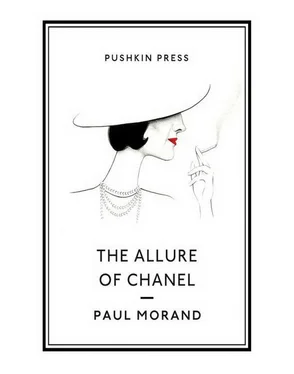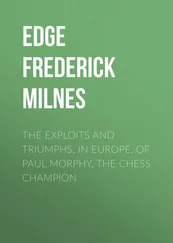Having loved her, Vuillard came to hate her. He wanted to paint my portrait; Misia made it up with him merely in order to prevent it. She is like the St Bernard who brings you back to the shore with your head under water. Misia is full of malice, in both the modern and the archaic meaning of the word.
She does everything by calculation; but if she knows how to divide and subtract, she is incapable of adding up.
She dug out some extraordinarily amusing clothes, which she kept for months, for years, and she knew how to give them a very makeshift appearance at the last moment.
She had absolutely no shame, no sense of honesty, but she had a grandeur and an innocence about her that surpassed everything one usually observes in women. (Let no one criticise me here for my harshness: for it’s because of all this that I adored her.) Gaffes terrify me; Misia loves them as one would some wonderful savoury dish. So far as love is concerned, Edwards and Sert were for her what gaffes are in the social sense: gaffes that were intended, premeditated, relished; for women without sexual drive, like her, these stimulants are necessary. What allowed her to retain her Jewish soul were the Jews themselves.
In a woman there is everything, and in Misia there was every sort of woman. She has no life of her own, she lives through others. She’s a parasite of the heart. Her love is atomic, it’s the splitting of the love atom. If I am bored somewhere, but especially if I’m having fun, Misia comes up to me:
“I can’t go on! Come home with me. We shall have fun.”
Once we’re in the car:
“Thank goodness we left, I was going to explode!”
And since she is a first-rate super-flirt, she soon makes me forget the place we had just left, she livens things up, she becomes marvellous, and all her virtues begin to shine.
Misia has the most serious virtue of all: she’s never boring, even though she’s always bored.
To distract her—everything to do with me amused her—and to inflame her curiosity, I invented bogus love affairs, imaginary passions. She was always taken in.
We were at anchor off Trieste, the time of day one whispers secrets.
“I’m returning to Venice, dear Misia, because I am suffering abominably; I’m madly in love with a man who loathes me.”
The word “suffering” elated Misia.
“There was I convinced that you had never suffered! How could you not have come and told me that earlier?”
When I threw down my cards, when I cried “April fool”, when I said to her: “Seeing you were bored, my dearest, I invented this little story,” Misia was appalled.
A few days later, in Venice, I almost perished from a fever; Misia was so disappointed and angry that she didn’t even ask for news of me.
And another time:
“If you swear you won’t repeat it, Misia, I’m going to tell you a secret.”
“Go on! Go on!”
“I … I’m going to marry the Prince of Wales! But not a word!”
“I … I’m going to stay here with you, because if I go away, I’ll spill everything!”
Misia is neither good nor bad: she’s one of the frailties of humanity, but she’s a force of nature. Her mere presence makes you want to speak badly of people. You don’t feel happy leaving her house; you regret the bad things you’ve said. She is generous: as long as you suffer, she’s ready to give everything, to give everything so that you suffer all the more.
As soon as she has spoken ill or done something harmful to someone, Misia is overcome with fear and runs over to her victim’s home as a precaution, overwhelms her with kind words, and explains that it’s for her own good; in short, she makes the first move. When I see her arrive, from the morning onwards, I welcome her like this:
“The things you must have said about me yesterday!”
In my case, I sometimes bite my friends, but Misia, she devours them.
Even when Misia speaks the truth, she finds a way of being amusing. I hate asking questions; I’m full of admiration for Misia’s brazen interrogative manner.
Misia’s tragedy is that she that she misses her opportunities, after having made everybody else miss theirs. But she miscarries only freaks. In this way all the important men, precisely because they were important, have eluded her; she has retained only what she has destroyed, that is to say nothing. There’s nothing left for Madame Verdurinska but to embroider her existence, under the marvelling eye of Monsieur Boulos.
Misia has not succeeded in corroding certain indestructible French spirits. My aunt Adrienne de Nexon, who lives near us, says of her:
“I called and had tea with ‘your Polish woman’.”
“My Polish woman?”
“Yes, that lady who wears satin slippers in the mornings … I don’t like her. She tried very cleverly to drag every secret out of me. I replied: ‘Madame, do you take me for an information service? …’ You’ve got some strange friends … How can you get on with these foreigners who are so badly brought up?”
AFTER THESE FEW MONTHS of exhilarating freedom (I had not taken a holiday for years), I returned to Paris and moved into the Ritz, where I stayed for six years.
I took up my dictatorial life once more: success and solitude. I was exhausted by my break. Nothing relaxes me so much as work, and nothing tires me so much as doing nothing. The more I work, the more I want to work.
I cannot take orders from anyone else, except in love; and even then … Nothing had changed in my absence. In other establishments, they allow for fifty chefs and sous-chefs. With me, there is only “Mademoiselle”. When I go away, I leave only mourners behind me. I very much respect other people’s liberty, while at the same time expecting reciprocity. Liberty, alas, is a gift that terrifies people; I don’t just mean theirs, but one’s own.
I was working towards a new society. Up until then they had been clothes designed for women who were useless and idle, women whose lady’s maids had to pass them their stockings; I now had customers who were busy women; a busy woman needs to feel comfortable in her clothes. You need to be able to roll up your sleeves. Beauty is not prettiness: why do so many mothers teach their daughters to be affected, instead of teaching them about beauty? It’s true, beauty is not learnt in a flash; but by the time you have learnt through experience, beauty has faded away! It’s one of the facets of the female tragedy. There are so many others, about which novelists and those “who look into a woman’s heart” are dreadfully unaware.
(May I be forgiven: it takes a great deal of courage not to see women as goddesses; and to say so!)
A man, for example, generally improves as he grows older, whereas his partner deteriorates. The face of a mature man is more beautiful than that of an adolescent. Ageing is Adam’s charm and Eve’s tragedy.
A woman ages badly. Look at this one, with her legs in the air, doing her physical education exercises under the glaring light of a beach umbrella.
“She’s downright ugly,” we would say.
And they reply to us:
“That’s my grandmother.”
A woman who is getting older takes more and more care of herself with every passing day; and one of the diabolical effects of inherent justice is that taking care of oneself is what ages one most. I feel sorry for those women who take rest cures with specialists who make them sit still for hours, in the darkness, in comfortable armchairs. The worst lines, those of egoism, are etched in their skin, there’s nothing to be done. However much one says, so as to flatter them: “She’s an angel,” angels also grow old. (We’ll talk about “angels” again in a moment.) No point in patting your double chin, it’s better to massage your morale.
Читать дальше












